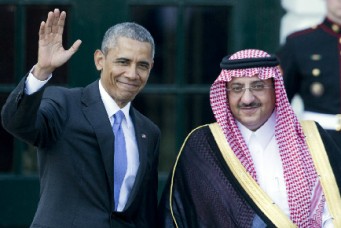Panic or r Coming of Age in the Gulf?
The UAE air attack in Libya clarifies a major shift underway in the worldviews and self-perceived roles of leading Arab states, who now throw their weight around the Middle East in a direct manner they never did previously.
The apparent air strike against targets in Tripoli, Libya last week by the United Arab Emirates (UAE) air force must go down as one of the most intriguing developments in the modern history of the Arab Gulf states. The fact that UAE planes allegedly used Egyptian air bases and other facilities to carry out the attack makes it even more intriguing — a sign of substantive, sophisticated cooperation by two Arab states to attack targets in a third Arab state.
This is significant because of two main factors: the increasing dynamism of Gulf Cooperation Council (GCC) states in using their military, financial and other assets in the service of political objectives around the Arab world; and, what this tells us about current GCC priorities in Arab ideological arenas. Both of these facets of the air attack in Libya clarify that a major shift is underway in the worldviews and self-perceived roles of leading Arab states, who now throw their weight around the Middle East in a direct manner they never did previously. This also partially fills the vacuum created by the slow disengagement, or repositioning, of global powers who have been reordering their priorities in the region.
The UAE-Egyptian attack against Libyan militias associated with Islamists and the so-called Misrata forces may reflect deep concern, even some panic, in the GCC and Egypt that the current chaotic situation in Libya could lead to a takeover of the government by Islamists. That the air strikes did not prevent the targeted Islamist militias from taking control of Tripoli airport is secondary to the fact that Egypt and the UAE felt the need to carry out the attack.
This has not happened in a vacuum, but rather continues a trend that we first witnessed with the outbreak of the Arab uprisings in late 2010. As citizen-led spontaneous uprisings in several Arab countries challenged Arab autocrats, removed some, and battled others across the region, the GCC states led by Saudi Arabia moved quickly to do what they could to ensure that they remained immune to such developments, and that ideological conditions remained to their liking. So GCC troops moved into Bahrain and also engaged in some of the air strikes against the Libyan regime of Moammar Gaddafi. Gulf states also sent various forms of assistance to rebels fighting to bring down the Assad regime in Syria, and backed their allies, friends and proxies in several other Arab countries that witnessed fateful confrontations between those who wanted to preserve or overthrow the status quo.
The overriding fear that seems to have prompted this UAE-Egyptian attack in Libya is that Islamists could come to power through three available means in the region these days — democratic elections, popular uprisings, or militia-based fighting. This same concern seems to shape other GCC policies in the region, such as supporting Jordan, the March 14 camp in Lebanon, and the Sisi government in Egypt. Such policies aim to prevent two things at all costs: democratic transitions that overturn the established conservative, security-based political orders, and incumbent Islamist governments that work closely with either Muslim Brotherhood-type movements or Iranian-supported Shiite movements.
The UAE and Egypt presumably calculated that some timely air strikes could deal a fatal blow to the Misrata militias, and thus help the opposing Zintan militias and the Khalifa Haftar forces prevail in the battle to control the new Libyan government that is trying to emerge into the light of day. That did not happen, and the Misrata group prevails for now; next week things may be different. Indeed, things will keep evolving in a chaotic way inside Libya for some time, until its two dueling governments ultimately give way to a single legitimate national government that can get on with the challenge of state-building.
GCC states are now deeply involved in these domestic battles across the region, often with different Gulf countries supporting opposing sides in places like Libya or Lebanon. Qatar and Iran reportedly have provided support to assorted Islamists in the region, while the UAE and Saudi Arabia are strongly backing anti-Islamists like the Sisi government in Egypt. This is a controversial step, to be sure, but it also represents a certain maturity in the worldview and behavior of GCC countries that liberally send their troops and money to engage in intense local ideological and military battles within other Arab states. This, after all, is how real countries behave in the world, especially now in the Middle East where local powers need to fill in for the retreating foreign powers.
We are therefore witnessing a coming of age of Gulf countries that seem determined to play a bigger role in ensuring their own wellbeing and shaping regional conditions to their linking, instead of waiting for Americans or Europeans to do this for them. We will find out in the years ahead how well they master the craft of nationhood in an evolving regional order.
Rami G. Khouri is editor-at-large of The Daily Star, and director of the Issam Fares Institute for Public Policy and International Affairs at the American University of Beirut, in Beirut, Lebanon. On Twitter: @ramikhouri.
Copyright © 2014 Rami G. Khouri—distributed by Agence Global




